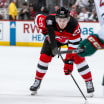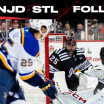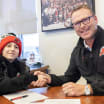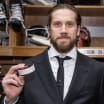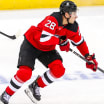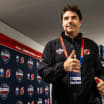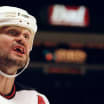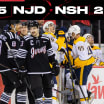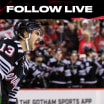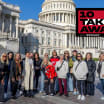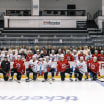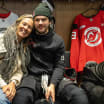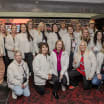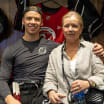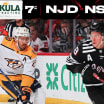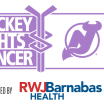Brian Boyle has been a 20-goal scorer in the NHL, and he's been a vital defensive forward for two teams that went to the Stanley Cup Final. He has been a penalty killer because of those defensive skills, and also someone sent to the front of the net on power plays to use his size. Boyle has been shifted away from center to fill needs for his teams, and he also has steadily improved on faceoffs over the course of his career.
Boyle: family a 'driving force' in leukemia fight
Brian Boyle leans on strong support system as he continues his battle with CML
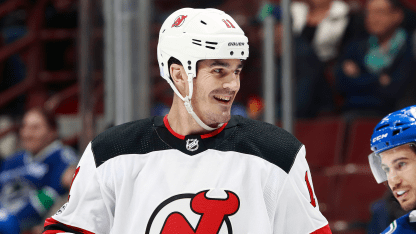
By
Jesse Spector @JesseSpector / newjerseydevils.com
Give Boyle a challenge on the ice, and he'll generally figure out a way to make the most of it and come out ahead. The 32-year-old has been doing that so far in his first month playing for the Devils, after missing training camp and all of October following a diagnosis of chronic myeloid leukemia.
"Now, life, things happen, and things are thrown at you, and it's chaos for a while, but I've said it before, I'm thankful for the team I've got at home," Boyle said. "The patience that my wife has is ridiculous. So, I can be a crabby kid sometimes, a teenager kicking and screaming about certain things, and she settles me down. My parents have always humbled me and made sure I've seen things with the right lenses. And, just, I think I've been blessed with the right people around me, either to keep me humble or build me up when I need it."
It was thinking of those people in his family, including his two children, that led Boyle to shed some tears on November 9, when he scored his first goal since getting that cancer diagnosis. The goal against the Oilers was a good way for Boyle to get back onto the scoresheet in his style - driving to the net and finishing his own play by popping home his own rebound, a hard-working effort.
"I've never enjoyed a goal more," Boyle said. "I've scored bigger goals, but I just think of how my life's changed, and for the better with kids now. You can't even imagine how that changes your life, and then when it does, you can't imagine your life before that. I can't even picture it. That's number one by a mile now, to the point where hockey's still - it's not like I care about hockey any less, but like, I thought, when I had the first kid, 'How can I love another kid like this?' Then you have another kid, and you're like the Grinch at the end of the movie. … I can't really explain it because I guess I've been keeping it in, but that's been driving me. It's a driving force for me wanting to play and play well, my kids and my wife."
The other reason for Boyle keeping it in is that he never has been much for talking about himself. Some of that is hockey culture. Some of that is who Boyle just generally is as a person. But some of it, even recognizing that dealing with cancer is very much personal and it's very much a time that people want to lend support, is more than that.
"It sounds, probably, sometimes, like I try to downplay the whole situation, but it's not like I'm actively doing that," Boyle said. "People have mentioned that to me, and it's like, if I don't, I dwell on it too much. I don't know what's gonna happen, I don't know how I'm gonna react, or how it's gonna affect my day-to-day. So, I'm just trying to kind of put it in my bag and just carry it along with me."
At the same time, Boyle knows that the spotlight cast upon him as a result of getting sick can be used for good. Boyle has been friends since college with Pete Frates, the man whose ALS diagnosis led to the Ice Bucket Challenge, and also draws inspiration from the charity work of former Rangers and Lightning teammate Ryan Callahan, and his late friend Corey Griffin, in whose honor Boyle wears No. 11 on his jersey.
"Corey's family started a foundation, in his name, for the children's hospitals, Cally's got the pediatric cancer, and Pete, he's changed the world in terms of ALS research and funding," Boyle said. "Those guys always impressed me so much. ... I want to use it as a platform now, if it's gonna be a lot of media talking about me, let's talk about how fortunate I am to have the medicine I have, because of the research and the money that's gone into the lymphoma and leukemia foundations, that I can take pills and play hockey in the NHL. I've been to children's hospitals, and I've been there recently, and it's the saddest thing I've ever seen in my life. It's not fair, and it can just rip families apart, and it's something that I think now is becoming clearer and clearer - what can you take out of this and spin it and make it a good thing? …
"We're so fortunate, and then we're fortunate because of the medical care, and we have the access - I'm right in, right away, and I have the appointments. There's so many positive things that come with it that people don't have access to, or people maybe don't have the means for. So, if I have it, and I can help provide or try to raise awareness or money, it's kind of a responsibility, you know what I mean?"
Boyle hasn't figured out exactly what the answer is yet. If it's like any other challenge that's come his way, you can bet he will.


